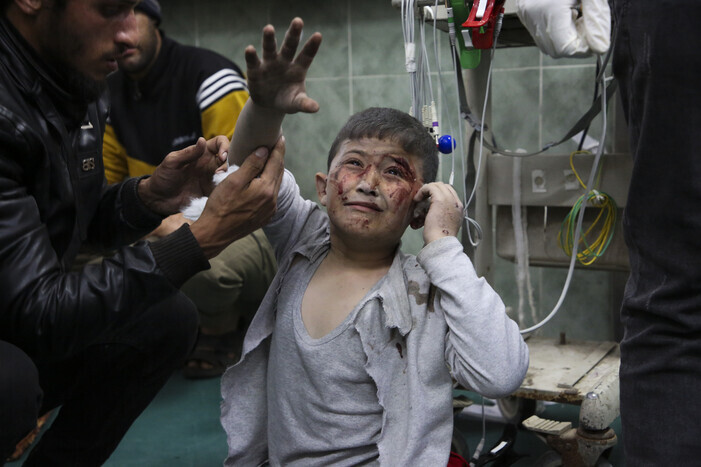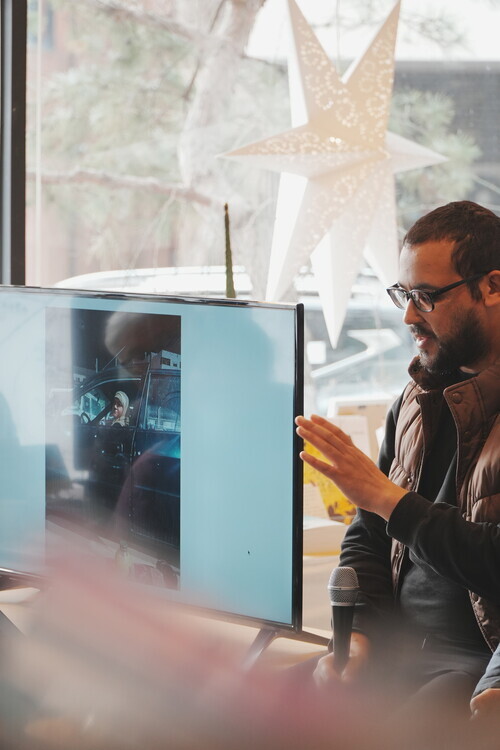hankyoreh
Links to other country sites 다른 나라 사이트 링크
[Guest essay] At only 26, I’ve seen 4 wars in my home of Gaza


By Saleh Elrantisi, Palestinian refugee
I was sitting in my seat in the classroom preparing to take an English language test. This was in the summer of 2008, when the continuous sounds of violent explosions began, and chaos spread throughout the school. I could see tongues of smoke rising from all directions. It was only moments before we realized that the Israeli occupation army had begun its war on the Gaza Strip. I quickly returned home and started watching television. I was very frightened and shocked by the scenes of death and destruction. That day marked the start of the story of the first war on the Gaza Strip that I was exposed to.
I am Saleh Elrantisi, I was born in 1997 in Gaza City. Since the first day of my life, I have been a refugee, as my family was forcibly displaced from the village of Yabna in 1948. My family lived displaced in various refugee camps including the Khan Yunis camp, the Al-Maghazi camp, and finally the Al-Shati camp.
I was born and raised in Gaza. Day after day, I began to realize the reality in which we live under occupation, and my suffering as a Palestinian refugee living in Gaza began to increase day after day. I did not think that just being born in this part of the earth would be enough to make me live in an unbearable hell, circumstances that are unfit for animals, let alone humans.
The story of the first bombing of my life
The Palestinians have suffered from killings and arrests for more than 75 years, but my first personal experience with the bombing of the Gaza Strip began around the year 2001. I had always wanted to have a pet. Around noon one day, I bought a small chick, and I was very happy with it. I built a house for it and provided it with food and drink. As soon as evening came, the sound of violent explosions began, and the house began to shake violently. My mother came and said that we must quickly go down to the ground floor and stay in my grandfather’s house, as we lived on the first floor, which is more dangerous than the lower floors. Fear overwhelmed me, and I was very worried about the chick that I had left at home and had not taken with me. I was almost 5 years old at that time.
This is my first memory of the bombings, but unfortunately, it was not my last.
My awareness of the misery of the situation we are living in began to grow, and I began to feel the effects of living as a refugee in my homeland. I listened intently to the stories of my grandfather, as he used to tell me how he left his home as a young man on foot towards Gaza after Zionist gangs forced him to leave his land.
He told me that when the Nakba (1967 Arab-Israeli War) broke out and they had to leave their home, his father told him not to take a lot of money and gold with him, as he was sure that they would leave their land only temporarily and would return no more than a few days later. But unfortunately, they all left and did not return until my grandfather died and was buried in Gaza.
My grandfather told me about the criminality of the occupation, the massacres committed against the indigenous people, the theft of land and heritage, and everything related to the rights of Palestinians, until I saw all of it with my own eyes in the Gaza Strip.
I came to Korea to escape war and destruction and in search of better opportunities. I entered Korea in December 2022 and began my new life and career here.
But less than a year after I came to Korea, this criminal and genocidal war began in Gaza. I write these words more than 120 days after the war. Nearly 30,000 people have been killed by the Israeli occupation army, most of them women and children. More than 60,000 people have been injured, and nearly 70% of the residential buildings and infrastructure in the Gaza Strip have been destroyed.
This war began while I was far from my homeland and my family, and I began to suffer a different kind of agony as an expatriate from my homeland and my family.
Since the first days of the war and the violent bombing of Gaza and the vicinity of my family’s home, I’ve had a real fear that my home would be bombed and all my family members would be martyred, as has happened with hundreds of families. The psychological pressure has been a great burden to live under.
Especially when communication with the Gaza Strip was cut off, I could no longer contact anyone in Gaza. This coincided with a very violent bombardment with hundreds of raids on civilian homes.
I am now 26 years old. I have now lived through four wars — those in 2008, 2012, 2014 and 2021. Moreover, I lived under a severe siege for nearly 19 years.
I lived in the largest open-air prison in the world
Have you ever wished you were a bird and not a human? I have wished for this before!
Since the bird is free, it can travel to any place around the world. It moves without walls, but I do not. I live in a cage surrounded by barbed wire fences (along the eastern borders of the Gaza Strip).
My suffering and the suffering of 2 million people in the Gaza Strip began in 2006, when the occupation government imposed a stifling siege on the Gaza Strip, closed the land crossing with Egypt and the land crossing with the occupying state, prevented imports and exports, imposed a naval blockade, and destroyed the only airport in Gaza. Thus, it became a city. Gaza, as a large prison, suffers from a great scarcity of basic services.
The electricity was cut off for more than 16 consecutive hours. At the beginning of the siege, we lived in complete darkness at night. We tried to use a small flashlight at night and went to sleep early because there was no power. Sometimes we used candles to light things, but my father refused to use them after many fires occurred in different areas of Gaza.
We found a solution, which was to use car batteries to power our lighting. As for the scarcity of cooking gas, we used wood or paper. As for cars, there is no alternative to gasoline other than using animals for transportation, but recently residents have developed a method, which is to use sunflower oil typically used for frying.
All of the above affected the availability of water, as the power outage made it difficult to obtain water.

All of this suffering was an almost daily occurrence in the Gaza Strip, and I remember its details clearly. But the most painful and difficult thing is when patients die while waiting to travel for treatment.
As the Gaza Strip has suffered due to the siege and repeated wars, there has been a severe shortage of treatment and the absence of many types of medicines, which makes the fate of patients linked to the possibility of their travel abroad.
My personal experience is harsh, as my older aunt, Aunt Fatema, suffered from malignant cancer. She tried to travel more than once, but was faced with constant rejection until they allowed her to travel after more than nine months, at which point the disease had spread throughout her body. The doctor told her, “You came too late,” and she died shortly afterward. This is one story out of thousands of stories that embody the suffering in which the residents of the Gaza Strip live.
I wrote these words after my grandfather, my uncle, my uncle’s wife, my cousin, and many friends were killed. My family miraculously survived the bombings more than once, my father’s car was hit, my sister’s house was completely destroyed, and my home was partially destroyed.
The war still continues, and thousands of displaced people are living in tents in the extreme cold. Unable to find anything to eat, they eat tree leaves and animal feed.
In conclusion, I hope that the suffering of my people will end, the war will stop, my country will be liberated, and we will live in peace and security.
Please direct questions or comments to [english@hani.co.kr]

Editorial・opinion
![[Column] Season 2 of special prosecutor probe may be coming to Korea soon [Column] Season 2 of special prosecutor probe may be coming to Korea soon](https://flexible.img.hani.co.kr/flexible/normal/500/300/imgdb/original/2024/0426/3317141030699447.jpg) [Column] Season 2 of special prosecutor probe may be coming to Korea soon
[Column] Season 2 of special prosecutor probe may be coming to Korea soon![[Column] Park Geun-hye déjà vu in Yoon Suk-yeol [Column] Park Geun-hye déjà vu in Yoon Suk-yeol](https://flexible.img.hani.co.kr/flexible/normal/500/300/imgdb/original/2024/0424/651713945113788.jpg) [Column] Park Geun-hye déjà vu in Yoon Suk-yeol
[Column] Park Geun-hye déjà vu in Yoon Suk-yeol- [Editorial] New weight of N. Korea’s nuclear threats makes dialogue all the more urgent
- [Guest essay] The real reason Korea’s new right wants to dub Rhee a founding father
- [Column] ‘Choson’: Is it time we start referring to N. Korea in its own terms?
- [Editorial] Japan’s rewriting of history with Korea has gone too far
- [Column] The president’s questionable capacity for dialogue
- [Column] Are chaebol firms just pizza pies for families to divvy up as they please?
- [Column] Has Korea, too, crossed the Rubicon on China?
- [Correspondent’s column] In Japan’s alliance with US, echoes of its past alliances with UK
Most viewed articles
- 1‘We must say no’: Seoul defense chief on Korean, USFK involvement in hypothetical Taiwan crisis
- 2Why Kim Jong-un is scrapping the term ‘Day of the Sun’ and toning down fanfare for predecessors
- 3Two factors that’ll decide if Korea’s economy keeps on its upward trend
- 4Gangnam murderer says he killed “because women have always ignored me”
- 5South Korea officially an aged society just 17 years after becoming aging society
- 6BTS says it wants to continue to “speak out against anti-Asian hate”
- 7After election rout, Yoon’s left with 3 choices for dealing with the opposition
- 8No good, very bad game for Korea puts it out of Olympics for first time since 1988
- 9Ethnic Koreans in Japan's Utoro village wait for Seoul's help
- 10US citizens send letter demanding punishment of LKP members who deny Gwangju Massacre